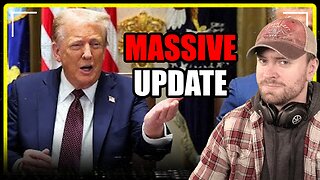Premium Only Content

The Igbo genocide and its aftermath!
https://amzn.to/3JLDHJF
The perpetrators, of what were unquestionably crimes against humanity appear to have got off free. The consequences of the Igbo genocide for Africa have been catastrophic.
In 1966, soon after the world commemorated the 21st anniversary of the liberation of Auschwitz and made the customary solemn declaration of ‘Never, Never Again’, Nigeria defiled that season of reflection, commiseration and hope. Its military officers, the police, Hausa-Fulani emirs, Muslim clerics and intellectuals, civil servants, journalists, politicians and other public figures planned and executed the Igbo genocide – the foundational genocide of post-(European)conquest Africa. [1] This is also Africa’s most devastating genocide of the 20th century. A total of 3.1 million Igbo people, a quarter of this nation’s population at the time, were murdered between 29 May 1966 and 12 January 1970.
Most of Africa and the world stood by and watched, hardly critical or condemnatory of this wanton destruction of human lives, raping, sacking and plundering of towns, villages, community after community in Biafra and elsewhere... Most Igbo were slaughtered in their homes, offices, businesses, schools, colleges, hospitals, markets, churches, shrines, farmlands, factories/industrial enterprises, children’s playground, town halls, refugee centres, cars, lorries, and at bus stations, railway stations, airports and on buses, trains and planes and on foot, or starved to death – the openly propagated regime-‘weapon’ to achieve its heinous goal more speedily. In the end, the Igbo genocide was enforced, devastatingly, by Nigeria’s simultaneously pursued land, aerial and naval blockade and bombardment of Igboland, Africa’s highest population density region outside the Nile Delta. Earlier on in 1945 and 1953, under the very watch of British occupation, the Hausa-Fulani political leadership had carried out two premeditated pogroms on Igbo immigrant populations in Jos and Kano in opposition to the Igbo vanguard role in the struggle for the restoration of Nigerian independence from British conquest. Hundreds of Igbo were murdered on each occasion and tens of thousands of pounds sterling worth of their property looted or destroyed. Neither in Kano nor Jos did the occupation regime apprehend or prosecute anyone for these massacres and destruction. Tragically, these pogroms turned out as ‘dress rehearsals’ for the 1966-1970 genocide.
The perpetrators, who subsequently seized and pillaged the rich Nigeria economy, appear to have got off free from any forms of sanctions from Africa (and the world) for what are, unquestionably, crimes against humanity. The consequences for Africa have been catastrophic. Several regimes elsewhere in Africa are ‘convinced’ of the conclusions that they have drawn from this crime by their Nigerian counterpart: ‘We can murder targeted constituent people(s) at will within the state we control … Haul off their prized property and livelihood … Comprehensively destroy their cities, towns, villages, communities – precisely their age long, priceless, inheritance ... There will be no sanctions from Africa – and the world’. As a result, the Igbo genocide becomes the clearing site for the haunting killing fields that would snake across the African geographical landscape in the subsequent 40 years, with the murders of additional 12 million Africans, since January 1970, by regimes in further genocide in Rwanda, Darfur and Zaïre/Democratic Republic of Congo and other killings in Liberia, Ethiopia, Congo Republic, Somalia, Uganda, Sierra Leone, Guinea, Côte d’Ivoire, Chad, South Sudan and Burundi.
-
 8:44:47
8:44:47
SpartakusLIVE
11 hours ago$20,000 Hide and Seek Tourney w/ Stonemountain64 || #1 Rat wins the BIG CHEESE
62.3K -
 2:34:02
2:34:02
Barry Cunningham
7 hours agoLISA COOK | ADAM SCHIFF | LETITIA JAMES | ARE THEY BEING SACRIFICED BY THE DEEP STATE?
89.4K53 -
 1:36:19
1:36:19
Flyover Conservatives
15 hours agoOnly 17% of Millennials Hit These 5 Adult Milestones—Why?; What If Childhood Trauma Is Behind Your Health Problems? - Dr. Troy Spurrill | FOC Show
32.6K4 -
 4:49:04
4:49:04
HogansAlleyHero
17 hours ago💥CHASING DOPAMINE💥✅TRUMP SAYS BATTLEFIELD IS THE BEST✅
41.8K3 -
 1:57:40
1:57:40
MattMorseTV
8 hours ago $10.90 earned🔴Trump just SHATTERED the PROJECTIONS.🔴
54.3K50 -
 2:32:19
2:32:19
megimu32
6 hours agoOTS: From Star Search to Superstardom
41.5K4 -
 1:56:21
1:56:21
Joker Effect
5 hours agoInterviewing GREENMAN! Looks like he is coming to Rumble! Let's give him a warm welcome! REAL TALENT
23.7K1 -
 1:07:21
1:07:21
Anthony Rogers
12 hours agoEpisode 380 - Is Pain All In Your Head?
16.6K3 -
 1:46:17
1:46:17
Glenn Greenwald
10 hours agoGlenn Takes Your Questions on Censorship, Epstein, and More; DNC Rejects Embargo of Weapons to Israel with Journalist Dave Weigel | SYSTEM UPDATE #505
118K8 -
 3:26:34
3:26:34
Jokeuhl Gaming and Chat
11 hours agoHelldivers 2 - Spreading Democracy w/ Ryker
13.2K1